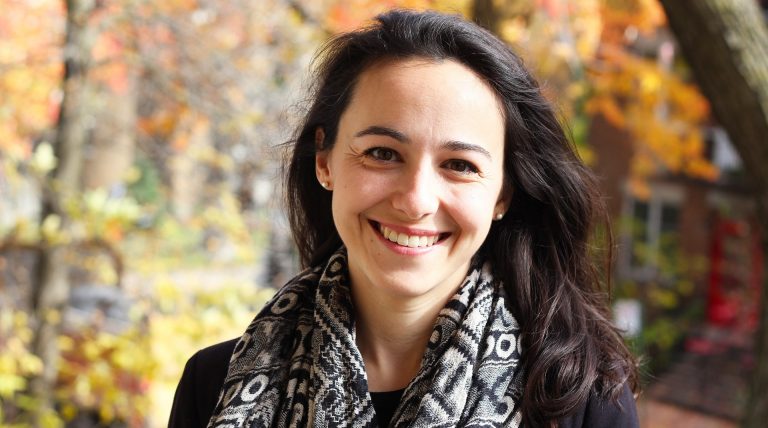Concordia PhD student wins a Joseph-Armand Bombardier graduate scholarship — and a Nelson Mandela award

The UN Convention on the Rights of the Child states that children everywhere should be guaranteed certain basic conditions, including protection, provisions for health care and education, and the ability to participate in society.
While this provides a solid benchmark to work from, a comprehensive application of the convention's standards requires constant vigilance and work.
This is where Concordia's Geneviève Grégoire-Labrecque wants to play a part.
The second-year PhD student in the Individualized (INDI) Program is currently working on a research project about the transformational potential of everyday participation for children and young people in Montreal.
"What I'm trying to do with this research is be a facilitator between youth and the implementation of the UN Convention on the Rights of the Child," she says. "My focus is on recent immigrants and young people, as they face discrimination.”
Grégoire-Labrecque is investigating how immigrant youth make their voices heard and how they actually participate in shaping their life and their environment. Her goal is to support them in what they are doing as legitimate right-bearers and to facilitate the implementation of their views and priorities.
This research earned her a Social Sciences and Humanities Research Council of Canada (SSHRC) Joseph-Armand Bombardier Canada Graduate Scholarship, which in turn led to a Nelson Mandela award.
Canada Graduate Scholarships provide recipients with a sum of $35,000 per year over three years.
Individualized approach
Coming from a background in anthropology, Grégoire-Labrecque draws on three fields of study for this research: applied human sciences, childhood studies and education, and social and cultural psychiatry.
"I want to better understand the context in which children and youth engage in their everyday lives here — at school, in community and with family — and see how these different contexts shape the opportunities they have to participate in and influence their lives," she explains.
“Of course, I keep an open mind about what it means for them to participate and if it is something that is important to them at all and under what conditions.”
She plans on mixing ethnographic techniques and participatory research, “involving them as co-researchers if they want, so we can ask together, is it possible for youth to participate in everyday life in a way that fosters social change. And if yes, how?”
Grégoire-Labrecque emphasizes that youth have ideas, a voice and their own ways of participating.
“So how as a researcher can I facilitate the implementation of their ideas and what they're going through in life?"
In the spirit of Mandela
The Nelson Mandela award was founded in 2013 by the SSHRC to honour the South African leader's legacy as it relates to "peace, justice and freedom through learning, understanding and education."
The prize is an honorific title that will be added to her Canada Graduate Scholarship in recognition of research conducted in one or more of the five areas championed by Mandela in his lifetime: national unity; democracy, freedom and human rights; leadership; children's participation in society and children's health.
"It's not about money — it's an acknowledgement that my research upholds the legacy of Nelson Mandela," says Grégoire-Labrecque. "It's an honour to receive it."
Find out more about Concordia’s School of Graduate Studies.


